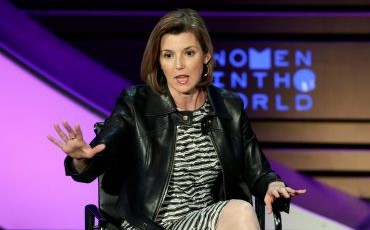Future of Work Strategist, Keynote Speaker & Two-Time Bestselling Author
Heather E. McGowan Biography
One of Forbes’ Top Futurists, Heather E. McGowan brings fresh energy and actionable insights to the future of work. A sought-after strategist, keynote speaker, and two-time bestselling author, she equips organizations to navigate relentless change by activating their most critical resource: their people.
McGowan’s audiences range from startups to publicly traded Fortune 500 companies, including Google, JPMorgan Chase, Mastercard, and Kaiser Permanente. Through data-driven insights and powerful visual frameworks, she helps leaders and teams transform their distinctly human capabilities— adaptability, empathy, and curiosity—into strategic advantages.
Often quoted in The New York Times, with Thomas Friedman calling her an “oasis” for her insights, McGowan’s bestselling books include "The Adaptation Advantage" and "The Empathy Advantage," which was named a Top 10 Business Book of 2023. By teaching people to ask better questions, she enables them to adapt at the speed of possibility to Solve Tomorrow’s Problems™.
Contact a speaker booking agent to check availability on Heather E. McGowan and other top speakers and celebrities.
Heather E. McGowan Speaking Topics
-
SOLVE TOMORROW’S PROBLEMS™: Harness Human Ingenuity to Navigate What's Next
Think organizations can't change quickly?
History proves otherwise.
When naysayers said "it can't be done," humans accomplished the impossible—in weeks, not years. Each pivotal moment reminds us of humanity’s most underestimated asset: our ability to adapt in the face of seemingly impossible odds.
In this perspective-shifting keynote, Heather E. McGowan challenges the myth that we resist change using unforgettable stories about a mop, a burrito, and a hermit crab to demonstrate how we can tap into our natural curiosity and hardwired drive to collaborate to see and shape what’s next.
Drawing from her bestselling books "The Adaptation Advantage" and "The Empathy Advantage," Heather reveals how leading organizations thrive when they place adaptability at their core, allowing them to find breakthrough opportunities where others least expect.
The audience will leave with:
- A powerful understanding of how to frame the right question
- Practical approaches to optimize how they adapt to new realities
- Clear frameworks for mapping the past to navigate the future
- An understanding of what it takes to spot unseen opportunities
-
THE AUGMENTED ADVANTAGE: Unleashing Human Potential in the AI Era
Think you can't remember phone numbers like you used to? You're not alone. As we hand off more tasks to technology, some of our more-human capabilities will naturally fade. Yet while automation may lead to atrophy in some areas, augmentation opens doors to entirely new human capabilities—if we are intentional. The key isn’t only using AI to replace what we currently do by automating it, but transforming work as we know it.
In this eye-opening presentation, Heather E. McGowan cuts through the AI hype to demonstrate why thriving alongside AI isn't about having the right answers. Instead, it's about asking better questions, framing new challenges, and treating AI as our partner—enhancing our capabilities and expanding our cognitive horizons.
The audience will leave with:
- A clear understanding of what to automate vs. augment—and why it matters
- Practical ways to learn from AI as a collaborative partner
- Fresh insights on how to build on uniquely human advantages in an AI world
- Necessary leadership shifts to drive optimal human performance
Heather E. McGowan Videos

Heather McGowan Showreel
We can Solve Tomorrow's Problems only when we are courageous and curious to ask better questions.



-
How do I book Heather E. McGowan to speak at my event?
Our experienced booking agents have successfully helped clients around the world secure speakers like Heather E. McGowan for speaking engagements, personal appearances, product endorsements, or corporate entertainment since 2002. Click the Check Availability button above and complete the form on this page to check availability for Heather E. McGowan, or call our office at 1.800.698.2536 to discuss your upcoming event. One of our experienced agents will be happy to help you get speaking fee information and check availability for Heather E. McGowan or any other speaker of your choice. -
What are the speaker fees for Heather E. McGowan
Speaking fees for Heather E. McGowan, or any other speakers and celebrities, are determined based on a number of factors and may change without notice. The estimated fees to book Heather E. McGowan are $30,000 - $50,000 for live events and $20,000 - $30,000 for virtual events. For the most current speaking fee to hire Heather E. McGowan, click the Check Availability button above and complete the form on this page, or call our office at 1.800.698.2536 to speak directly with an experienced booking agent. -
What topics does Heather E. McGowan speak about?
Heather E. McGowan is a keynote speaker and industry expert whose speaking topics include Artificial Intelligence, Business, Business Growth, Business Leadership, Change Management, Communication, Corporate Culture, Economy, Emotional Intelligence, Ethics & Integrity, Female Leadership, Future of Work, Futurism, Human Resources, Influential Women, Innovation, Inspirational, Leadership, Motivational, Peak Performance, Personal Growth, Psychology, Resilience, Social Sciences, Teamwork & Teambuilding, Technology, Virtual, Women in Business, Women in Tech -
Where does Heather E. McGowan travel from?
Heather E. McGowan generally travels from Boston, MA, USA, but can be booked for private corporate events, personal appearances, keynote speeches, or other performances. For more details, please contact an AAE Booking agent. -
Who is Heather E. McGowan’s agent?
AAE Speakers Bureau has successfully booked keynote speakers like Heather E. McGowan for clients worldwide since 2002. As a full-service speaker booking agency, we have access to virtually any speaker or celebrity in the world. Our agents are happy and able to submit an offer to the speaker or celebrity of your choice, letting you benefit from our reputation and long-standing relationships in the industry. Please click the Check Availability button above and complete the form on this page including the details of your event, or call our office at 1.800.698.2536, and one of our agents will assist you to book Heather E. McGowan for your next private or corporate function. -
What is a full-service speaker booking agency?
AAE Speakers Bureau is a full-service speaker booking agency, meaning we can completely manage the speaker’s or celebrity’s engagement with your organization from the time of booking your speaker through the event’s completion. We provide all of the services you need to host Heather E. McGowan or any other speaker of your choice, including offer negotiation, contractual assistance, accounting and billing, and event speaker travel and logistics services. When you book a speaker with us, we manage the process of hosting a speaker for you as an extension of your team. Our goal is to give our clients peace of mind and a best-in-class service experience when booking a speaker with us. -
Why is AAE Speakers Bureau different from other booking agencies?
If you’re looking for the best, unbiased speaker recommendations, paired with a top-notch customer service experience, you’re in the right place. At AAE Speakers Bureau, we exclusively represent the interests of our clients - professional organizations, companies, universities, and associations. We intentionally do not represent the speakers we feature or book. That is so we can present our clients with the broadest and best performing set of speaker options in the market today, and we can make these recommendations without any obligation to promote a specific speaker over another. This is why when our agents suggest a speaker for your event, you can be assured that they are of the highest quality with a history of proven success with our other clients.
Heather E. McGowan is a keynote speaker and industry expert who speaks on a wide range of topics such as SOLVE TOMORROW’S PROBLEMS™: Harness Human Ingenuity to Navigate What's Next, THE AUGMENTED ADVANTAGE: Unleashing Human Potential in the AI Era, LEADING IN THE AGE OF UNCERTAINTY: The Curiosity Advantage, CLEAR ON PURPOSE: Turning Purpose into Performance Through a Shared Vision and START WITH TRUST: The Lifeblood of High-Performing Teams. The estimated speaking fee range to book Heather E. McGowan for your event is $30,000 - $50,000. Heather E. McGowan generally travels from Boston, MA, USA and can be booked for (private) corporate events, personal appearances, keynote speeches, or other performances. Similar motivational celebrity speakers are Erica Dhawan, Zack Kass, Erik Qualman, Andrew Busch and Ian Beacraft. Contact All American Speakers for ratings, reviews, videos and information on scheduling Heather E. McGowan for an upcoming live or virtual event.
This website is a resource for event professionals and strives to provide the most comprehensive catalog of thought leaders and industry experts to consider for speaking engagements. A listing or profile on this website does not imply an agency affiliation or endorsement by the talent.
All American Entertainment (AAE) exclusively represents the interests of talent buyers, and does not claim to be the agency or management for any speaker or artist on this site. AAE is a talent booking agency for paid events only. We do not handle requests for donation of time or media requests for interviews, and cannot provide celebrity contact information.
If you are the talent and wish to request a profile update or removal from our online directory, please submit a profile request form.





.png)




























